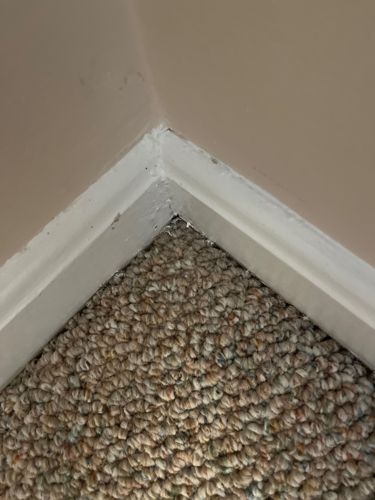Carpet Beetle (larva)
Scientific Name: Anthrenus scrophulariae (Varied Carpet Beetle), Attagenus unicolor (Black Carpet Beetle), Trogoderma variabile (Warehouse Beetle) - exact species cannot be determined from the image as only damage is visible, but the damage pattern is consistent with carpet beetle larvae.
Order & Family: Order: Coleoptera, Family: Dermestidae
Size: Larvae typically range from 2-5 mm in length. Adults are usually 2-4 mm.

Natural Habitat
Indoors, commonly found in homes, museums, and warehouses. They infest carpets, rugs, upholstered furniture, clothing, furs, and stored food products. Outdoors, they can be found in bird nests, animal burrows, and around dead insects.
Diet & Feeding
Natural fibers like wool, silk, fur, feathers, and leather; also dried animal products, pet food, and sometimes spices or grains. They do not feed on synthetic fibers.
Behavior Patterns
Carpet beetle larvae typically avoid light and prefer to dwell in dark, undisturbed areas, such as under furniture, in cracks and crevices, and behind baseboards. They may feed for several months to a year before pupating. Adults are attracted to light and often found near windows.
Risks & Benefits
Risks: Can cause significant damage to household items made of natural fibers, including carpets, clothing, and furniture. Some people may experience skin irritation or allergic reactions from bristles shed by the larvae. Benefits: In nature, they play a role as decomposers, breaking down organic matter.
Identified on: 8/11/2025